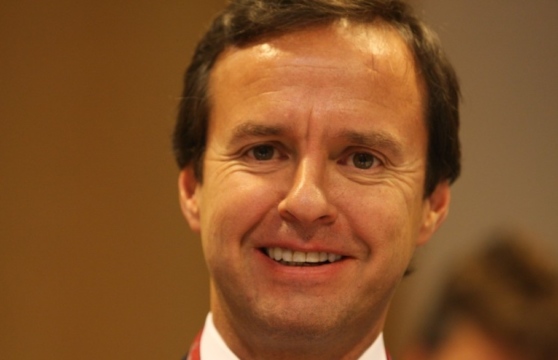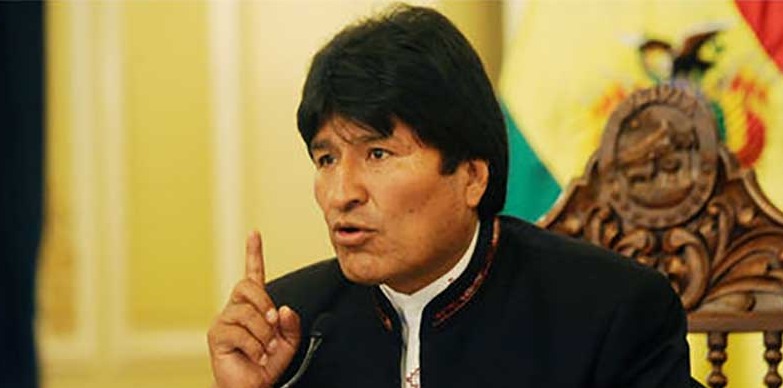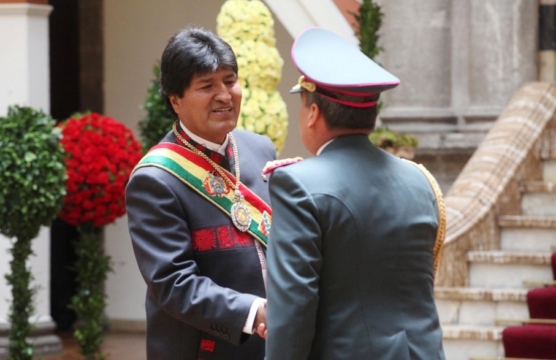
A Conversation with Jorge Quiroga
In early October, Morales announced he will run for a third presidential term . Is democracy under seige?
A Daily Publication of The Dialogue
Former Bolivian President Evo Morales said recently that his Movement for Socialism, or MAS, party on Jan. 19 will name its candidate for the country’s upcoming presidential election. Conservative interim President Jeanine Áñez has vowed to hold new elections following the country’s disputed October vote, and the government has set May 3 as the date for the new election. How much influence will Morales have on the election? Will the election lead to political stability in Bolivia? What conditions must surround the vote in order for its winner to be seen as legitimate? Which candidates have the best chances of winning?
Kathryn Ledebur, director of the Andean Information Network in Cochabamba: “New elections can only foster political stability if there is a level playing field and a fair, transparent electoral process. These indispensable guarantees include the extension of the democratically elected legislature’s mandate, ending on Jan. 22, until the swearing in of newly elected officials. The interim administration should limit its actions to organizing and facilitating elections. MAS, the largest national party, must have the right to choose candidates and campaign freely without risk of arbitrary detention. Áñez officials must refrain from threats and arrests of journalists, MAS officials and critics on sedition and terrorism charges, order security forces to cooperate fully with legal and rights investigations, and actively protect national human rights defenders, such as personnel from the Office of the Human Rights Ombudsman. The Trump administration has announced USAID support for the electoral process, and potentially further cooperation, although there is no funding allocated to Bolivia. This cooperation could provoke further conflict and mistrust due to Trump officials’ statements supporting Áñez and a complicated history of bilateral relations. A proposal to rebuild electoral infrastructure destroyed during the conflict should take priority. Contradictory statements and dramatic shifts in OAS positions during the vote count and ensuing conflict highlight that U.N. and E.U. representatives should take the lead in electoral monitoring. MAS is internally debating potential candidates with some regional differences of opinion; undoubtedly Morales will be consulted and will not unilaterally select candidates. Coca grower leader Andrónico Rodriguez, Morales’ appointed successor, will most likely run for vice president, accompanying a seasoned presidential candidate.”
Iván C. Rebolledo, managing partner at TerraNova Strategic Partners and president of the Bolivian-American Chamber of Commerce: “Evo Morales’ influence over the past few weeks has clearly begun to wane. In recent meetings that he has convened in Argentina for his followers, attendance has been minimal. The MAS party has begun to show divisions between the hardliners (Andrónico Rodríguez, currently vice president of the Federation of Coca Growers) and more moderate/progressive leaders (Eva Copa, president of the Senate). Senator Copa played a key role in moving the new electoral law/process forward, which won her the wrath of hardline MAS elements within her party and the Legislative Assembly. Everyone now awaits who MAS will name as its candidate, with speculation that a centrist will be chosen in an attempt to be a unifying force within the party and attract more votes nationally. In a Jan. 2 UNITEL poll, 66 percent of the population is still unsure for whom they will vote in May. In that same poll, the MAS party led in popularity, followed by current interim President Jeanine Áñez, who has said she will not run, followed by Carlos Mesa and Marco Pumari (leader of the Comité Cívico de Potosí). The phenomena of the Luis Fernando Camacho/Marco Pumari candidacy is interesting with its constant ups and downs and has clearly shaken up the electoral landscape for traditional candidates. One of the first steps of this transitional government was to appointment a new Supreme Electoral Tribunal, which is composed of renowned and respected electoral scholars and professionals who will clearly contribute to the legitimacy of the upcoming elections, along with the participation of the international community.”
Beatrice Rangel, member of the Advisor board and director of AMLA Consulting in Miami Beach: “Evo Morales will always be influential within his party and in the coca growing region of Chapare, given his role in creating MAS and in supporting the drug trade, which has enhanced the well-being of coca producers. But the time has come for Bolivia and the rest of Latin America to get serious about facing the modern-day scourge represented by transnational organized crime. MAS will have to choose between continuing to be led by an authoritarian thug with links to organized crime and becoming a party that represents the interests of working people in Bolivia. In the first case, it could be prosecuted as a criminal organization. For the vote to further democracy in Bolivia, the election needs to be internationally organized and supervised by a country or group of countries that have exercised democracy for more than a century. Most successful candidates will most certainly be those who have sprung from the civic movement that was at the root of the Morales downfall. Ultimately, it was the civil society who set the limits to authoritarian rule.”
Jaime Aparicio, Bolivian ambassador to the Organization of American States and former Bolivian ambassador to the United States: “The resignation and escape of Evo Morales to Mexico resulted in an international campaign of misinformation. Following the ‘malicious manipulation’ of the October elections, which the OAS and European Union publicly denounced, the election was canceled by the Bolivian Legislative Assembly itself, which MAS controls with a two-thirds majority. Bolivians expect the revival of democratic institutions and the rule of law. The Legislative Assembly has unanimously elected a new Electoral Tribunal, chaired by a well-known electoral expert, Salvador Romero. He is regarded as having the legitimacy, knowledge and prestige necessary to build confidence in the new electoral process. However, the elections will take place in the midst of deep political, moral and social fractures, which the Morales government promoted over the last 15 years. His level of influence in the next election remains to be seen. He recently summoned the leaders of his party to meet in Buenos Aires in order to elect the MAS candidates, but a significant number of his party’s indigenous leaders have decided not to attend. Therefore, it is foreseeable that dissident groups, mostly indigenous not involved in the coca business, will designate their own candidate regardless of Morales’ decisions. While Morales and the ‘cocaleros’ seem to be more interested in destabilizing the democratic process, new actors from MAS are embracing the democratic game. Among them is the current president of the Senate, Eva Copa, a young indigenous leader from El Alto. Morales’ party may force a ballotage, especially if the opposition runs with a variety of candidates, as seems to be the case. However, everything seems to indicate that in the case of a second round, any candidate opposed to Morales would get massive support from citizens who peacefully resisted Morales’ authoritarianism.”
Miguel Centellas, Croft instructional assistant professor of sociology and international studies at the University of Mississippi: “The upcoming elections will be a severe test for Bolivia’s democratic institutions. While MAS remains the largest single political party, its candidate is not likely to win a majority—and might not meet the 40 percent threshold necessary to avoid a runoff election. Carlos Mesa remains fairly popular as a figure of the establishment opposition. But the field will be crowded by a new generation of anti-MAS political figures, such as Fernando Camacho and Marco Pumari. The two leaders of their departmental ‘civic committees’ catapulted to center stage during the public protests against electoral fraud committed by Morales officials. All this points to the likelihood that no party will win a legislative majority, with votes and legislative seats split across a half dozen political parties, like in the 2002 election. But unlike 2002, Bolivia no longer has a ‘parliamentarized’ presidential system. Prior to the 2009 constitution, if no presidential candidate won a simple majority, then the newly elected legislature met to select a president from among the top two contenders. This type of system resembled a traditional parliamentary system, and political parties negotiated formal power-sharing coalition agreements. This system explained Bolivia’s democratic stability (when compared to Ecuador and Peru) from the mid-1980s through the 1990s. Without such a constitutional provision, I am skeptical that a broad ‘unity’ coalition can be formed. The most likely outcome is a minority president trying to govern alongside a fragmented and polarized legislature.”
 The Latin America Advisor features Q&A from leaders in politics, economics, and finance every business day. It is available to members of the Dialogue’s Corporate Program and others by subscription.
The Latin America Advisor features Q&A from leaders in politics, economics, and finance every business day. It is available to members of the Dialogue’s Corporate Program and others by subscription.
In early October, Morales announced he will run for a third presidential term . Is democracy under seige?
With Morales’ approval rating at 75%, it is likely that voters will re-elect him for a third consecutive term
Bolivian President Evo Morales won re-election with an estimated 60 percent of the vote. What can investors expect?
 Bolivia’s interim government has banned former President Evo Morales from running in the country’s May 3 election. His party is expected to select its candidate next Sunday. // File Photo: Bolivian Government.
Bolivia’s interim government has banned former President Evo Morales from running in the country’s May 3 election. His party is expected to select its candidate next Sunday. // File Photo: Bolivian Government.
